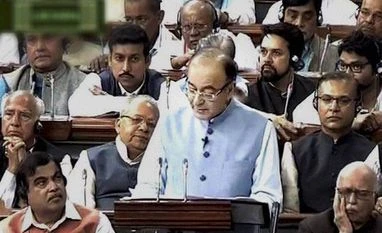The Union Budget 2016-17 turned out to be a damp squib for banks, as public sector lenders, weighed down by capital-eroding bad debts in their books, did not get an increase in their capital allotment beyond the planned Rs 25,000 crore announced last year.
However, the government gave a push to the consolidation agenda of banks in the Budget. Union Finance Minister Arun Jaitley said in his Budget speech that the government has started the process of transformation of IDBI Bank and will look at bringing down government's stake in the bank below 50 per cent, from 80.16 per cent now.
The Bank Board Bureau, set up on 28 February, will propose ways for consolidation of existing public sector banks, he said in his Budget speech, but the immediate priority is to strengthen banks' balance sheets, Jaitley later clarified.
"Our public sector banks will have to be strong and competitive," Jaitley said in his speech, adding "the bank board bureau will be operationalized during 2016-17 and a roadmap for consolidation of public sector banks will be spelt out," Jaitley said.
Clarifying on a televised meeting with editors, Jaitley said the consolidation will not be an "alternative for improving their balance sheets."
Later in the evening, in his interaction with the press, the finance minister said the government was committed to bring down its stake in public sector banks to 52 per cent, but not before strengthening of balance sheets.
"Our immediate agenda is to strengthen the banks," Jaitley said, adding, the capitalisation number quoted in the Budget may not be the final one.
More From This Section
"This is not the last word on recapitalisation. Be prepared for something more," he said, adding there were still some recapitalisation amount left from this year to be carried forward in the next year.
Jaitley said the process of transformation of IDBI Bank has already started and "government will take it forward and also consider the option of reducing its stake to below 50%."
Referring to government's intent to reduce stake below 50 per cent, B K Batra, deputy managing director of IDBI Bank said when this happens, bank will have greater flexibility in operations and this will help to realise business potential.
Earlier, government's stake in the bank had dipped below 60 per cent, creating rigidity in raising capital. First government had to infuse capital and only then some room got created for raising capital from others, Batra said, adding the latest proposal would free the lender from any such constraints.
But IDBI could be the easiest and obvious target for bank privatisation. The bank is established under the Companies Act and a privatisation proposal need not be moved in the Parliament.
"What is feasible for IDBI may not be feasible for other banks," said Ananda Bhoumik, senior director, India Ratings and Research.
The analyst community was largely expecting the government to propose higher capital infusion for public sector banks, but that did not happen.
The proposed Rs 25,000 crore is part of the planned recapitalisation that the government announced last year, under its Indradhanush programme. Under the plan, the government will infuse Rs 70,000 crore in phases and has already infused Rs 19,950 crore to 13 public sector banks. Hence, there is nothing much new in the racapitalisation front, except Jaitley's assurance that the government was ready with more capital if needed be and it stands "solidly behind these Banks."
Analysts were not assured though.
"The support provided by the Union Budget was very inadequate," said Vaibhav Agrawal, head of research at Angel Broking Ltd.
"Overall, there was nothing much to address the stressed assets of public sector banks. Inadequate capital support would mean that the banks would have to dragged on and provide for bad debts from their own P&L and they won't be able to lend much," Agrawal said.
To help a faster resolution of stressed assets, the finance minister said the debt recovery tribunals will be strengthened, and the government will computerise processing of court cases to improve the existing infrastructure and faster disposal of cases.
The government will also try and push for the passage of Insolvency and Bankruptcy law, Jaitley said in his speech.
Apart from the resolution mechanism of companies, a comprehensive Code on Resolution of Financial Firms will be introduced as a Bill in the Parliament during 2016-17. This Code will provide a specialised resolution mechanism to deal with bankruptcy situations in banks, insurance companies and financial sector entities.
)